2017 年浙江宁波大学二外英语考研真题
I. Cloze (20%)
Direction: Read the passage carefully, and fill in each blank with the words given
below. You can’t use any word twice.
punishments
license
move
traffic
when
driving
discourage
consideration
police
illegal
such as
offenses
breaking
implemented
introduction
purpose
running
credit
similar
number
ON NOV 8 AND 9, a national police conference on urban traffic management was held
in Shanghai, according to which the 1 will put traffic violations, especially serious
illegal conducts and accidents, in the credit records of the drivers.
The drivers that cause major accidents, 2 those involving casualties, face criminal
charges or other deserved 3 , but the penalties for illegal behavior that is
potentially dangerous but has not caused an accident, such as 4 a red light, are
far from enough as drivers only get a fine and decreasing points on their 5 , which
fails to curb their bad 6 habits.
That's why the new measure, namely listing 7 driving conducts into drivers' 8___
records, is a welcome 9 . It will help effectively 10 people from breaking the law.
With the 11 of this new measure, people are expected to be more careful 12 driving.
Some cities have already adopted a 13 policy, namely raising the insurance for those
who have been caught 14 the rules of the road. That has proved successful because
the data show a decrease in the 15 of drivers caught running red lights and breaking
the 16 rules.
Of course, citizens' rights must be taken into 17 when implementing the policy
including driving 18 on their credit records. Drivers should be able to appeal, and
the power to edit people's credit records should be transparent to ensure it is not
abused.
Only the rule of law can govern modern society well, and credit records best serve
that 19 . The new measure is therefore welcome and we hope it can be 20 smoothly
and effectively.
II. Reading comprehension (40%)
Directions: There are 4 passages in this section. Each passage is followed by some
questions or unfinished statements. For each of them there are four choices marked
A), B), C) and D). You should decide on the best choice and write the corresponding
letter on the Answer Sheer.
Passage One
Questions 1 to 5 are based on the following passage.
I'm usually fairly skeptical about any research that concludes that people are either
happier or unhappier or more or less certain of themselves than they were 50 years
ago. While any of these statements might be true, they are practically impossible
to prove scientifically. Still, I was struck by a report which concluded that
today’s children are significantly more anxious than children in the 1950s. In fact,
�
the analysis showed, normal children ages 9 to 17 exhibit a higher level of anxiety
today than children who were treated for mental illness 50 years ago.
Why are America’s kids so stressed? The report cites two main causes: increasing
physical isolation — brought on by high divorce rates and less involvement in
community, among other things — and a growing perception that the world is a more
dangerous place.
Given that we can’t turn the clock back, adults can still do plenty to help the
next generation cope.
At the top of the list is nurturing (培育) a better appreciation of the limits of
individualism. No child is an island. Strengthening social ties helps build
communities and protect individuals against stress.
To help kids build stronger connections with others, you can pull the plug on TVs
and computers. Your family will thank you later. They will have more time for
face-to-face relationships, and they will get more sleep.
Limit the amount of virtual (虚拟的) violence your children are exposed to. It’s
not just video games and movies; children see a lot of murder and crime on the local
news.
Keep your expectations for your children reasonable. Many highly successful people
never attended Harvard or Yale.
Make exercise part of your daily routine. It will help you cope with your own
anxieties and provide a good model for your kids. Sometimes anxiety is unavoidable.
But it doesn’t have to ruin your life.
1. The author thinks that the conclusions of any research about people’s state of
mind are _______.
A) surprising B) confusing C) illogical D) questionable
2. What does the author mean when he says, “we can’t turn the clock back” (Line
1, Para. 3)?
A) It’s impossible to slow down the pace of change.
B) The social reality children are facing cannot be changed.
C) Lessons learned from the past should not be forgotten.
D) It’s impossible to forget the past.
3. According to an analysis, compared with normal children today, children treated
as mentally ill 50 years ago _______.
A) were less isolated physically B) were probably less self-centered
C) probably suffered less from anxiety D) were considered less individualistic
4. The first and most important thing parents should do to help their children is
_______.
A) to provide them with a safer environment B) to lower their expectations for them
C) to get them more involved socially D) to set a good model for them to follow
5. What conclusion can be drawn from the passage?
A) Anxiety, though unavoidable, can be coped with.
B) Children’s anxiety has been enormously exaggerated.
C) Children’s anxiety can be eliminated with more parental care.
D) Anxiety, if properly controlled, may help children become mature.
�
Passage Two
Questions 6 to 10 are based on the following passage:
Engineering students are supposed to be examples of practicality and rationality,
but when it comes to my college education I am an idealist and a fool. In high school
I wanted to be an electrical engineer and, of course, any sensible student with my
aims would have chosen a college with a large engineering department, famous
reputation and lots of good labs and research equipment. But that's not what I did.
I chose to study engineering at a small liberal arts (文科) university that doesn't
even offer a major in electrical engineering. Obviously, this was not a practical
choice; I came here for more noble reasons. I wanted a broad education that would
provide me with flexibility and a value system to guide me in my career. I wanted
to open my eyes and expand my vision by interacting with people who weren't studying
science or engineering. My parents, teachers and other adults praised me for such
a sensible choice. They told me I was wise and mature beyond my 18 years, and I
believed them.
I headed off to college sure I was going to have an advantage over those students
who went to big engineering “factories” where they didn't care if you had values
or were flexible. I was going to be a complete engineer: technical genius and
sensitive humanist (人文学者) all in one. Now I'm not so sure. Somewhere along the
way my noble ideals crashed into reality, as all noble ideals eventually do. After
three years of struggling to balance math, physics and engineering courses with
liberal arts courses, I have learned there are reasons why few engineering students
try to reconcile (协调) engineering with liberal arts courses in college.
The reality that has blocked my path to becoming the typical successful student is
that engineering and the liberal arts simply don't mix as easily as I assumed in
high school. Individually they shape a person in very different ways; together they
threaten to confuse. The struggle to reconcile the two fields of study is difficult.
6. The author chose to study engineering at a small liberal arts university because
he ______
A) wanted to be an example of practicality and rationality
B) intended to be a combination of engineer and humanist
C) wanted to coordinate engineering with liberal arts courses in college
D) intended to be a sensible student with noble ideals
7. According to the author, by interacting with people who study liberal arts,
engineering students can _____.
A) balance engineering and the liberal arts B) receive guidance in their careers
C) become noble idealists D) broaden their horizons
8. In the eyes of the author, a successful engineering student is expected _______
A) to have an excellent academic record B) to be wise and mature
C) to be imaginative with a value system to guide him D) to be a technical genius
with a wide vision
9. The author's experience shows that he was ______.
A) creative B) ambitious C) unrealistic D) irrational
10. The word “they” in “... together they threaten to confuse.” (Line 3, Para.
�
5) refers to ______.
A) engineering and the liberal arts B) reality and noble ideals
C) flexibility and a value system D) practicality and rationality
Passage Three
Questions 11 to 15 are based on the following passage
For millions of years before the appearance of the electric light, shift work,
all-night cable TV and the Internet, Earth’s creatures evolved on a planet with
predictable and reassuring 24-hour rhythms. Our biological clocks are set for this
daily cycle. Simply put, our bodies want to sleep at night and be awake during the
day. Most women and men need between eight and eight and a half hours of sleep a
night to function properly throughout their lives. (Contrary to popular belief,
humans don’t need less sleep as they age.)
But on average, Americans sleep only about seven and a half hours per night, a marked
drop from the nine hours they averaged in 1910. What’s worse, nearly one third of
all Americans get less than six hours of sleep on a typical work night. For most
people, that’s not nearly enough.
Finding ways to get more and better sleep can be a challenge. Scientists have
identified more than 80 different sleep disorders. Some sleeping disorders are
genetic. But many problems are caused by staying up late and sleeping in, by traveling
frequently between time zones or by working nights. Dr. James F. Jones at National
Jewish Medical and Research Center in Denver says that sleep disorders are often
diagnosed as other discomforts. About one third of the patients referred to him with
possible chronic fatigue syndrome actually have treatable sleep disorders. “Before
we do anything else, we look at their sleep,” Jones says.
Sleep experts say that most people would benefit from a good look at their sleep
patterns. “My motto is ‘Sleep defensively’,” says Mary Carskadon of Brown
University. She says people need to carve out sufficient time to sleep, even if it
means giving up other things. Sleep routines — like going to bed and getting up
at the same time every day—are important. Pre-bedtime activities also make a
difference. As with Elsner, who used to suffer from sleeplessness, a few lifestyle
changes — avoiding stimulants and late meals, exercising hours before bedtime,
relaxing with a hot bath — yield better sleep.
11. What is TRUE of human sleep?
A) Most people need less sleep when they grow older.
B) Most people need seven and a half hours of sleep every night.
C) On average, people in the U.S. today sleep less per night than they used to.
D) For most people, less than six hours of sleep on a typical work night is enough.
12. For our bodies to function properly, we should _______.
A) sleep for at least eight hours per night
B) believe that we need less sleep as we age
C) adjust our activities to the new inventions
D) be able to predict the rhythms of our biological clocks
13. According to the author, many sleeping disorders are caused by _______.
A) other diseases B) pre-bedtime exercises
�
C) improper sleep patterns D) chronic fatigue syndrome
14. Which of the following measures can help you sleep better?
A) Staying up late. B) Taking a hot bath. C) Having late meals. D) Traveling between
time zones.
15. “Sleep defensively” means that _______.
A) people should go to a doctor and have their problems diagnosed
B) people should exercise immediately before going to bed every night
C) people should sacrifice other things to get enough sleep if necessary
D) people should give up going to bed and getting up at the same time every day
Passage Four
Questions 16 to 20 are based on the following passage
It is natural for young people to be critical of their parents at times and to blame
them for most of the misunderstanding between them. They have always complained,
more or less justly, that their parents are out of touch with modern ways; that they
are possessive and dominant; that they do not trust their children to deal with crisis;
that they talk too much about certain problems; and they have no sense of humor,
at least in parent-child relationships.
I think it is true that parents often underestimate their teenage children and also
forget how they themselves felt when young.
Young people often irritate their parents with choices in clothes and hairstyle,
in entertainers and music. This is not their motive. They feel cut off from the adult
world into which they have not yet been accepted. So they create a culture and society
of their own. Then, if it turns out that their music of entertainers or vocabulary
or clothes or hairstyles irritate their parents, this gives them additional
enjoyment. They feel they are superior, at least in a small way, and that they are
leaders in style and taste.
Sometimes you are resistant and proud, because you do not want your parents to approve
of what you do. If they did approve, it looks as if you are the underdog: you can’t
win but at least you can keep your honor. This is a passive way of looking at things.
It is natural enough after long years of childhood, when you were completely under
your parents’ control. But it ignores the fact you are now beginning to be
responsible for yourself.
If you plan to control your life, cooperation can be part of that plan. You can charm
others, especially your parents, into doing things the ways you want. You can impress
others with your sense of responsibility and initiative, so that they will give you
the authority to do what you want to do.
16. The author is primarily addressing ______.
A) parents and teachers B) newspaper readers
C) those who give advice to teenagers D) teenagers
17. The first paragraph is mainly about ______.
A) the teenagers’ criticism of their parents
B) misunderstanding between teenagers and their parents
C) the dominance of the parents over their children
D) the teenagers’ ability to deal with crisis
�
18. Teenagers tend to have strange clothes and hairstyle because they ______.
A) want to show their existence by creating a culture of their own
B) have a strong desire to be leaders in style and taste
C) have no other way to enjoy themselves better
D) want to irritate their parents
19. Teenagers do not want their parents to approve of whatever they do because they
______.
A) have already been accepted into the adult world
B) feel that they are superior in a small way to the adults
C) are not likely to win over the adults
D) have a desire to be independent
20. To improve the parent-child relationships, teenagers are advised to be _______.
A) obedient B) responsible C) cooperative D) independent
III. Cloze (10%)
Direction: Directions: In this section, there is a passage with ten blanks. You are
required to select one word for each blank from a list of choices given in a word
bank following the passage. Read the passage through carefully before making your
choices. Each choice in the bank is identified by a letter. Please mark the
corresponding letter for each item on the Answer Sheet. You may not use any of the
words in the bank more than once.
THE GOVERNMENT of Hangzhou, capital of East China's Zhejiang province, has issued
a new policy to improve the working and living conditions of rural teachers at the
grassroots level and to make sure the more remote the countryside school is, the
1 level of treatment the teachers will receive.
Village teachers work in relative poverty and 2 and bear a heavy workload, which
results in people's respect for those who do the job, but 3 who are willing to do
the work.
With the efforts of all levels of government and a package of policies to make the
job more rewarding, more young people will be attracted to join the 4 and remain
in their posts for a while.
The low pay, tough working conditions and hardships of life in remote areas mean,
in reality, teachers in the remote areas 5 not to stay there long. Even if the salaries
for teachers in rural areas are made higher, even much more, than they are for those
in 6 areas, the rural teachers may still opt to leave not for salary 7 for a more
comfortable and respectable life.
Japan is a good example to learn from. With uniform wage standards across the country,
governments and societies make joint endeavors to hire more village teachers. Now,
even in the remotest countryside, schools are 8 with swimming pools, music classrooms,
libraries and other facilities.
To improve the living conditions of teachers in remote areas, the local governments
have even built accommodation specifically for rural teaching 9 .
With the rapid pace of 10 in China, we should expect more funds, more benefits and
more facilities to go into supporting teachers in the countryside. It needs to become
a respectable job so that more young people are encouraged to choose it as a career.
�
IV. Fill in each blank with the correct form of the word given to each sentence.
(15%)
1. When we watch a world-class musician or a top athlete, we don’t see the years
of preparation that ______ him or her to become great. (able)
2. But if you are prepared, the _______ is on the other folks — the ones who haven’t
done their homework. (press)
3. Graduate schools generally require _______ to submit scores on the Graduate Record
Exam. (apply)
4. While a little ______ can keep you on top of your game, too much can destroy your
confidence and ruin your chances of success. (anxious)
5. Two of the most ______ things about driving a car are getting lost and getting
stuck in traffic. (frustrate)
6. The automobile created mobility on a scale never known before, and the total effect
on living habits and social customs is _______ worldwide. (end)
7. It is crucial to accurately read body language to avoid _________ in social
interactions. (understand)
8. The _______ of the Chinese civilization comes from its millenniums-long cultural
self-confidence and its continuous interactions among its own ethnic groups and with
outside civilizations. (vital)
9. A "free trade area" (FTA) is formed when at least two states _______ or fully
abolish custom tariffs on their inner border. (part)
10. When having spring rolls, people eat the entire roll from one end to the other,
________ that everything in the coming year will end in success. (symbolize)
11. For this study, ______ analyzed the component of air pollution known as fine
particulate matter (PM2.5) -- the tiny pieces of solid or liquid pollution emitted
from motor vehicles, factories, power plants, fires, and smoking. (investigate)
12. For this study, investigators analyzed the component of air pollution known as
fine particulate matter (PM2.5) -- the tiny pieces of solid or liquid pollution
_______ from motor vehicles, factories, power plants, fires, and smoking. (emit)
13. The _______ were based on a systematic review and meta-analysis of studies dating
back between 1982 and 2015, which evaluated relationships between egg intake and
coronary heart disease (276,000 subjects) and stroke (308,000 subjects). (find)
14. Among 10 and 11 year old children, 26 percent living in the most deprived areas
were ______ compared to 11.7 percent living in the least deprived areas. (obesity)
15. It seems that too many young folks in China are pressured into marriages they're
neither prepared for emotionally or mentally, nor are they prepared for it _______.
�
(material)
Part V. Writing (15%)
Directions: For this part, you are required to write a short essay entitled On the
Shopping Waste of Double 11th following the paragraph given below. You should write
at least 160 words. According to the State Post Bureau, the number of express
deliveries reached almost 100 million on Nov 11 last year, which means about 100
million boxes were needed to pack the parcels. How do you recycle these boxes? How
do you dispose of Nov 11 shopping day waste?
�
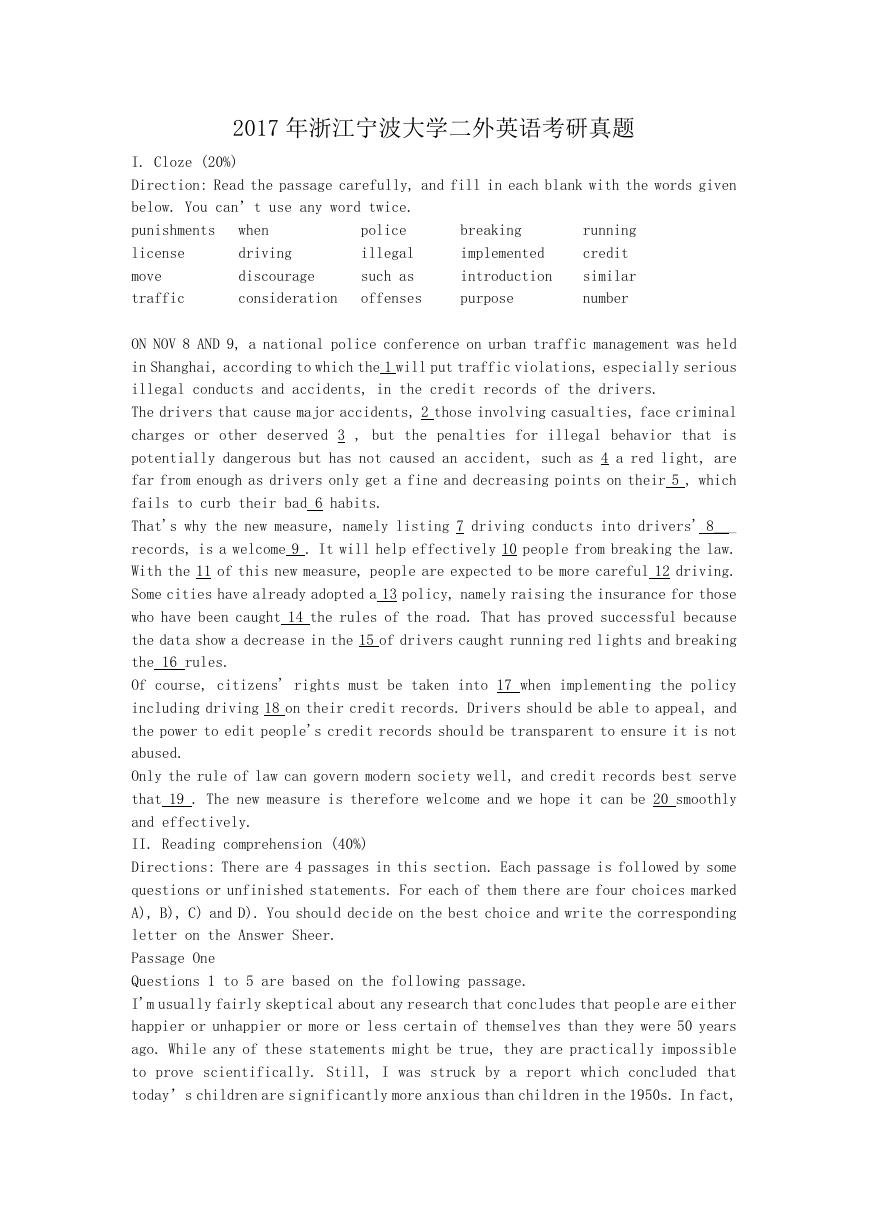
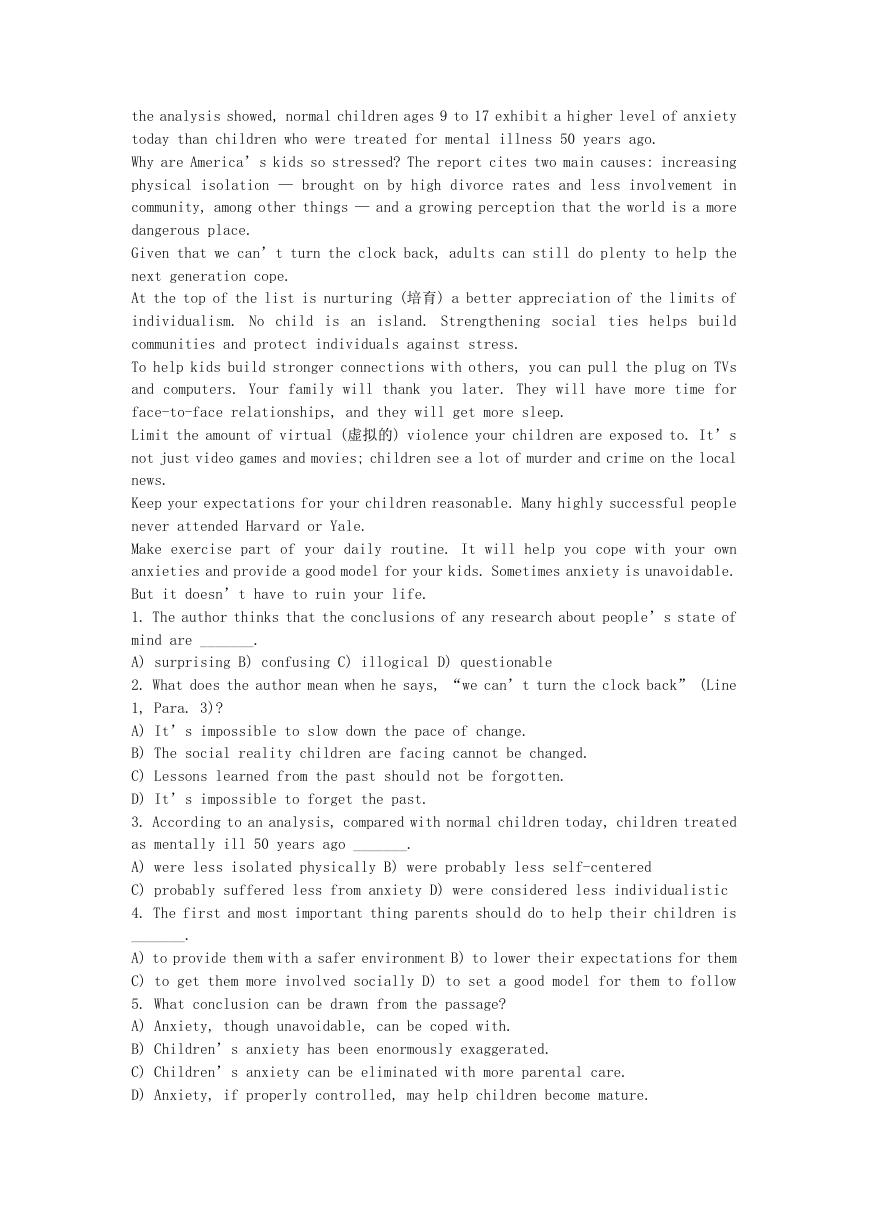

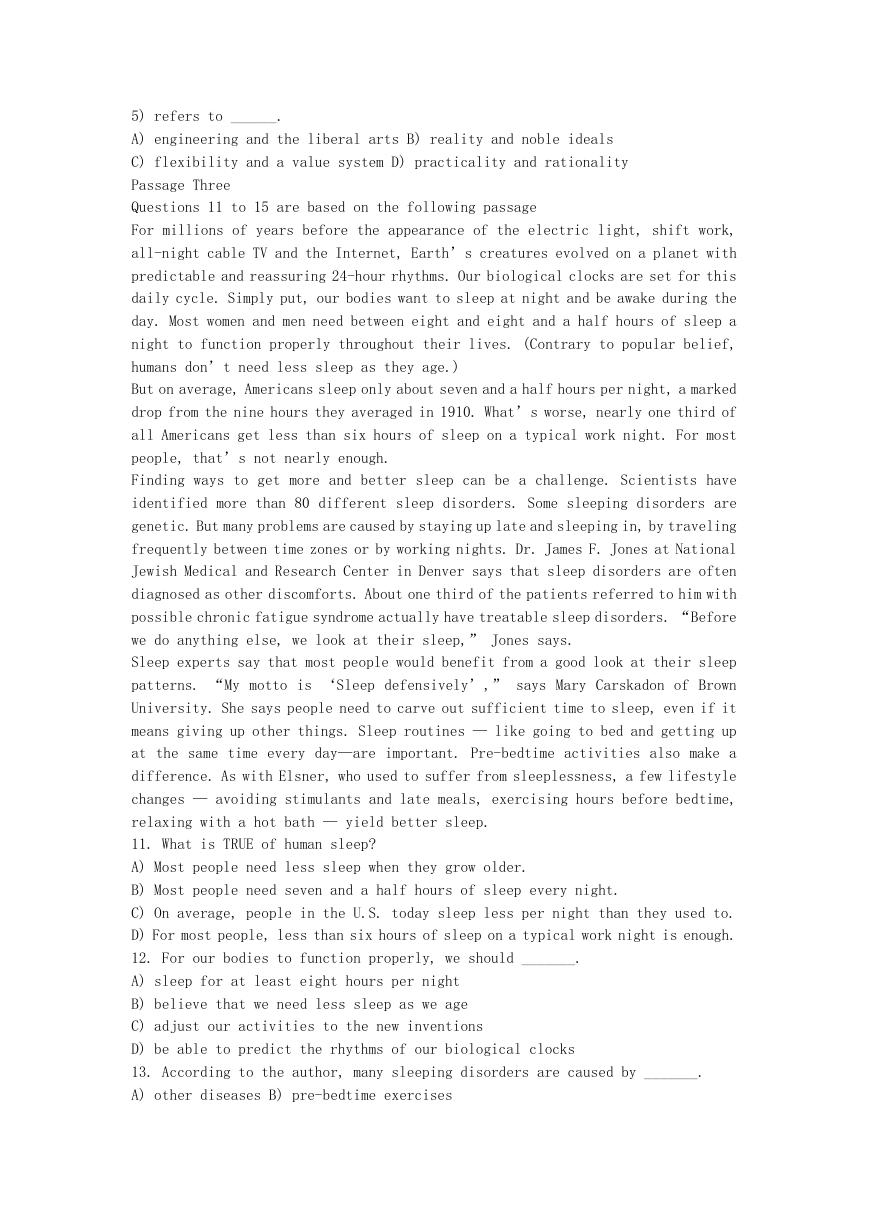
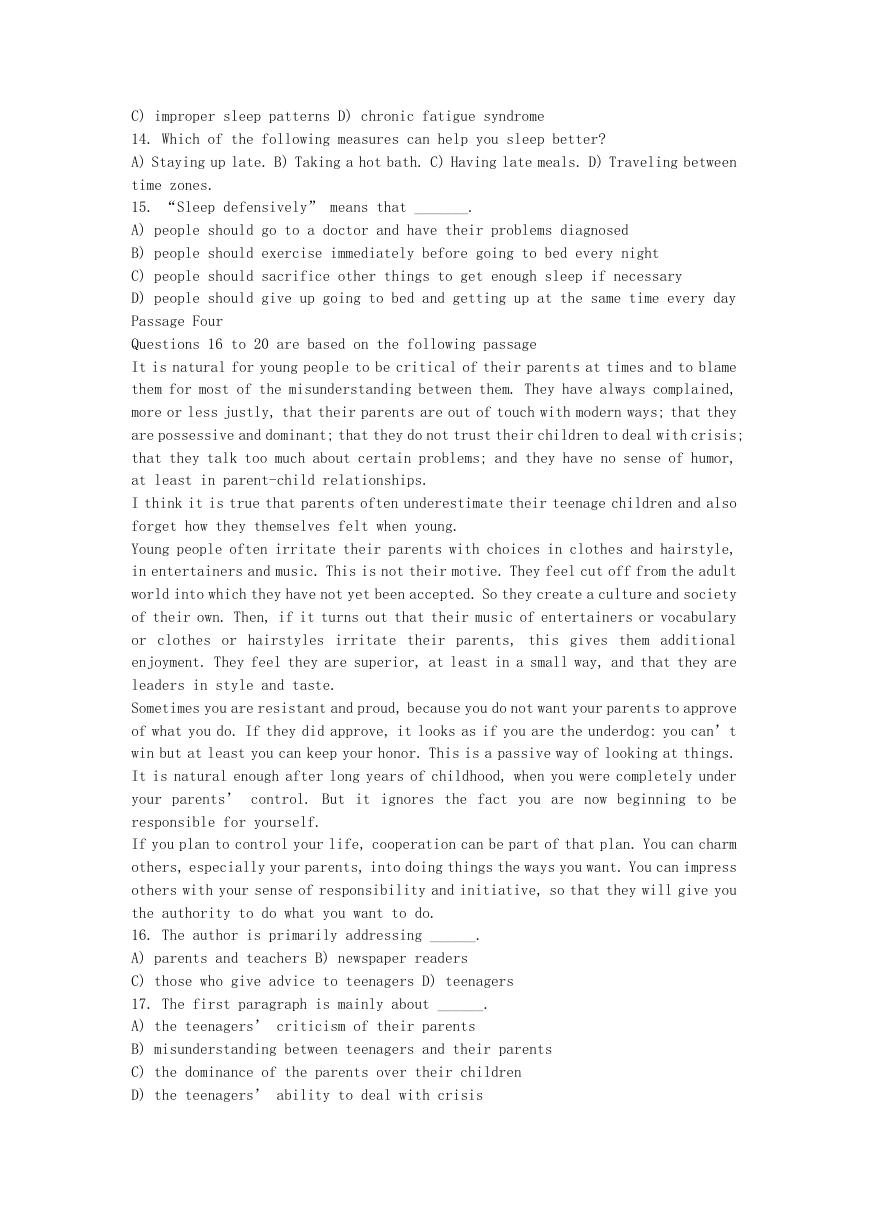
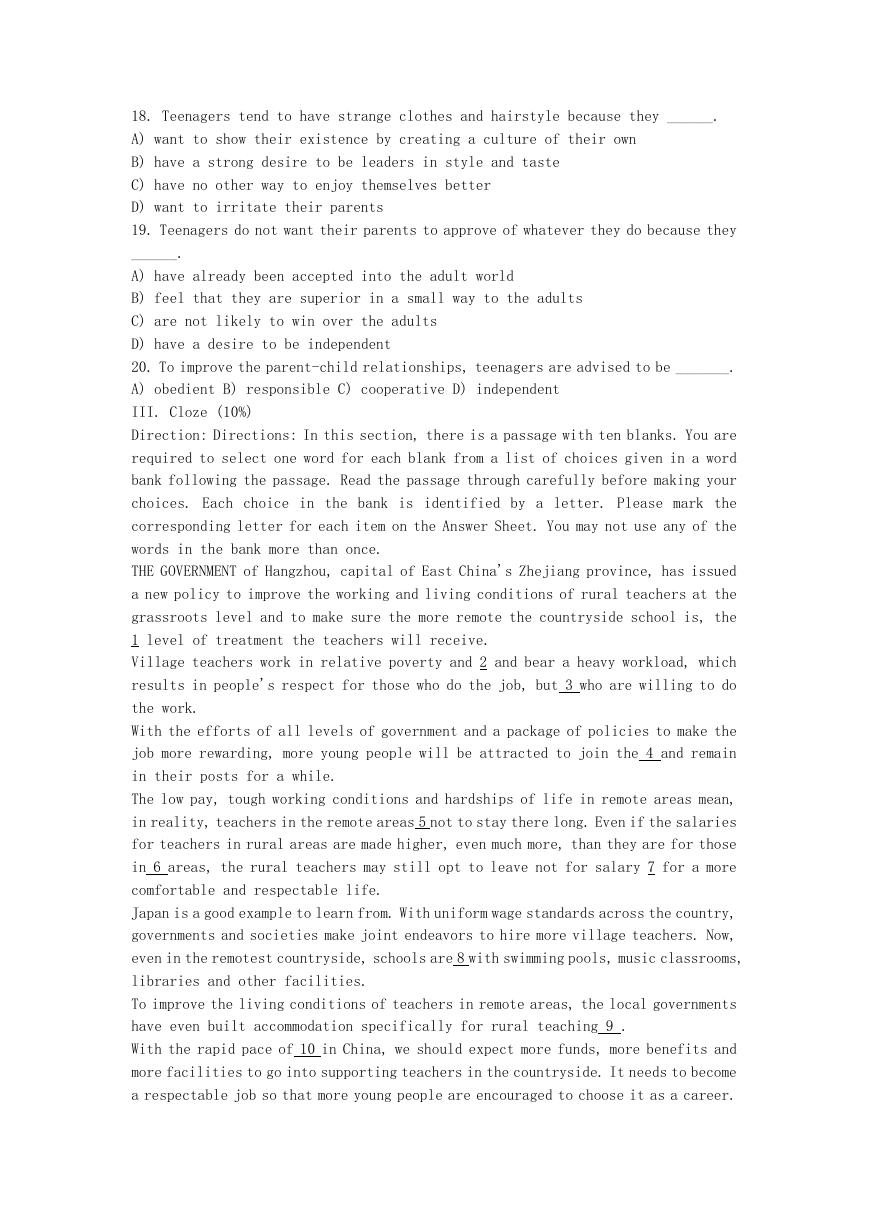
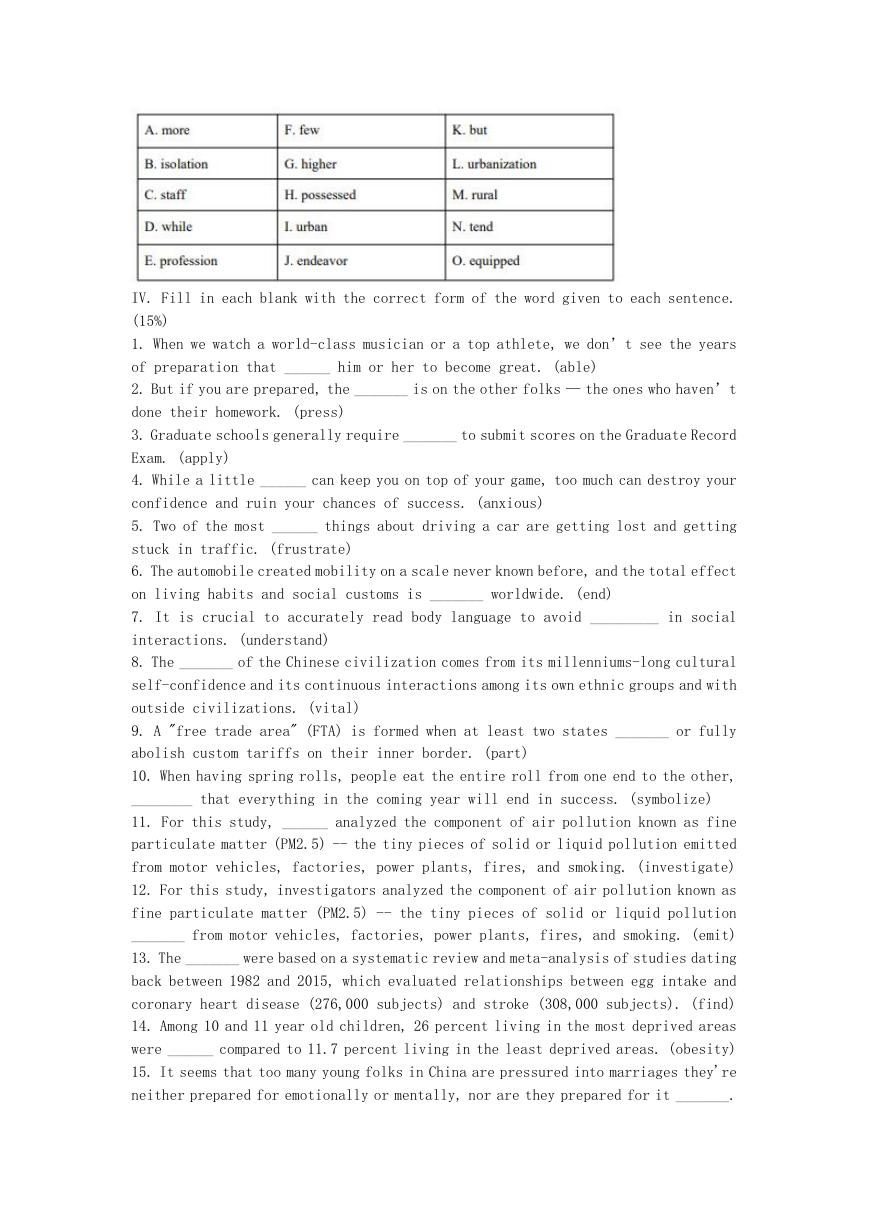
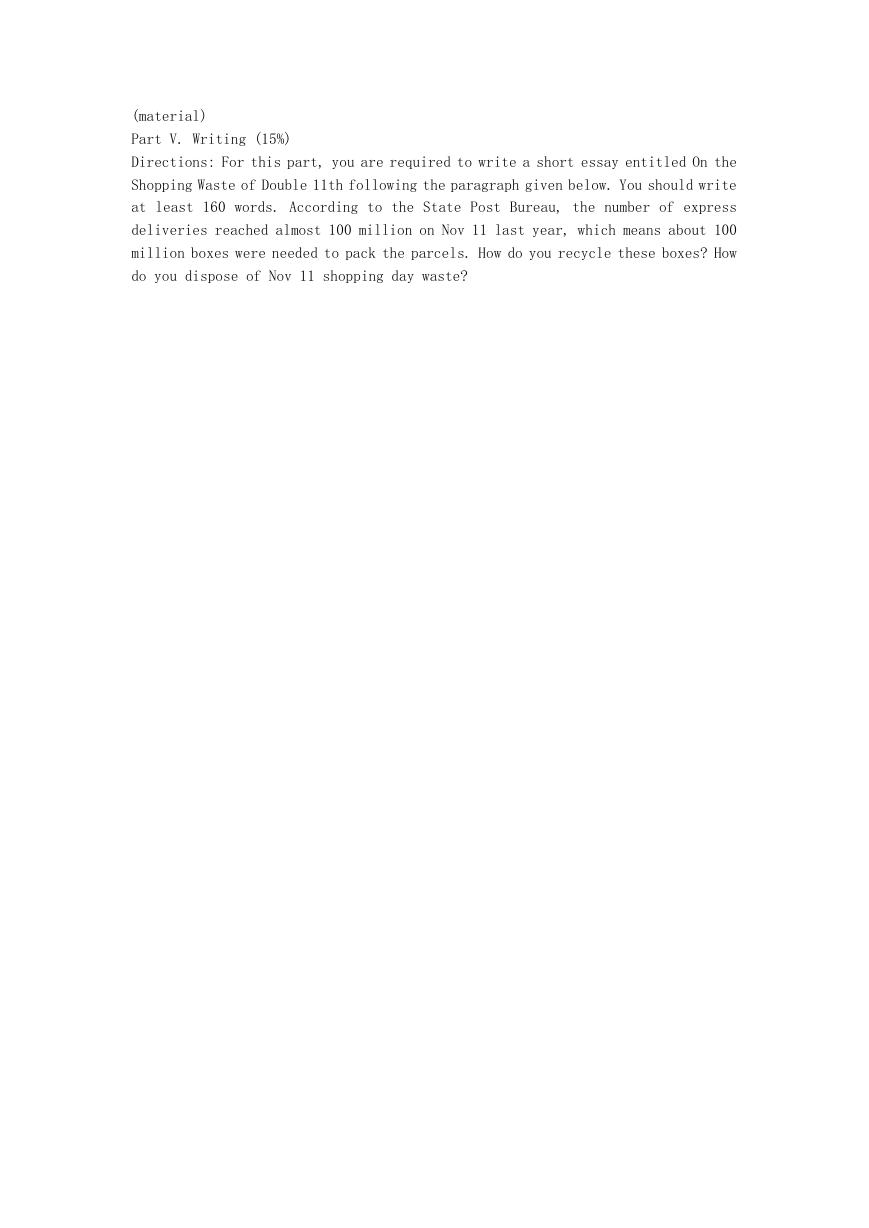








 2023年江西萍乡中考道德与法治真题及答案.doc
2023年江西萍乡中考道德与法治真题及答案.doc 2012年重庆南川中考生物真题及答案.doc
2012年重庆南川中考生物真题及答案.doc 2013年江西师范大学地理学综合及文艺理论基础考研真题.doc
2013年江西师范大学地理学综合及文艺理论基础考研真题.doc 2020年四川甘孜小升初语文真题及答案I卷.doc
2020年四川甘孜小升初语文真题及答案I卷.doc 2020年注册岩土工程师专业基础考试真题及答案.doc
2020年注册岩土工程师专业基础考试真题及答案.doc 2023-2024学年福建省厦门市九年级上学期数学月考试题及答案.doc
2023-2024学年福建省厦门市九年级上学期数学月考试题及答案.doc 2021-2022学年辽宁省沈阳市大东区九年级上学期语文期末试题及答案.doc
2021-2022学年辽宁省沈阳市大东区九年级上学期语文期末试题及答案.doc 2022-2023学年北京东城区初三第一学期物理期末试卷及答案.doc
2022-2023学年北京东城区初三第一学期物理期末试卷及答案.doc 2018上半年江西教师资格初中地理学科知识与教学能力真题及答案.doc
2018上半年江西教师资格初中地理学科知识与教学能力真题及答案.doc 2012年河北国家公务员申论考试真题及答案-省级.doc
2012年河北国家公务员申论考试真题及答案-省级.doc 2020-2021学年江苏省扬州市江都区邵樊片九年级上学期数学第一次质量检测试题及答案.doc
2020-2021学年江苏省扬州市江都区邵樊片九年级上学期数学第一次质量检测试题及答案.doc 2022下半年黑龙江教师资格证中学综合素质真题及答案.doc
2022下半年黑龙江教师资格证中学综合素质真题及答案.doc